Key takeaways
- Portland’s writers community promotes creativity, inclusivity, and diverse voices, fostering personal growth and connection among writers.
- Literary Arts serves as a vital hub, where critique sessions encourage collaboration and support, transforming feedback into an act of care.
- Effective critique methods include reading aloud and focused line-by-line feedback, balancing encouragement with constructive suggestions to build trust.
- Applying critique skills to one’s own writing practice enhances objectivity, clarity, and narrative flow, leading to significant improvements in the work.
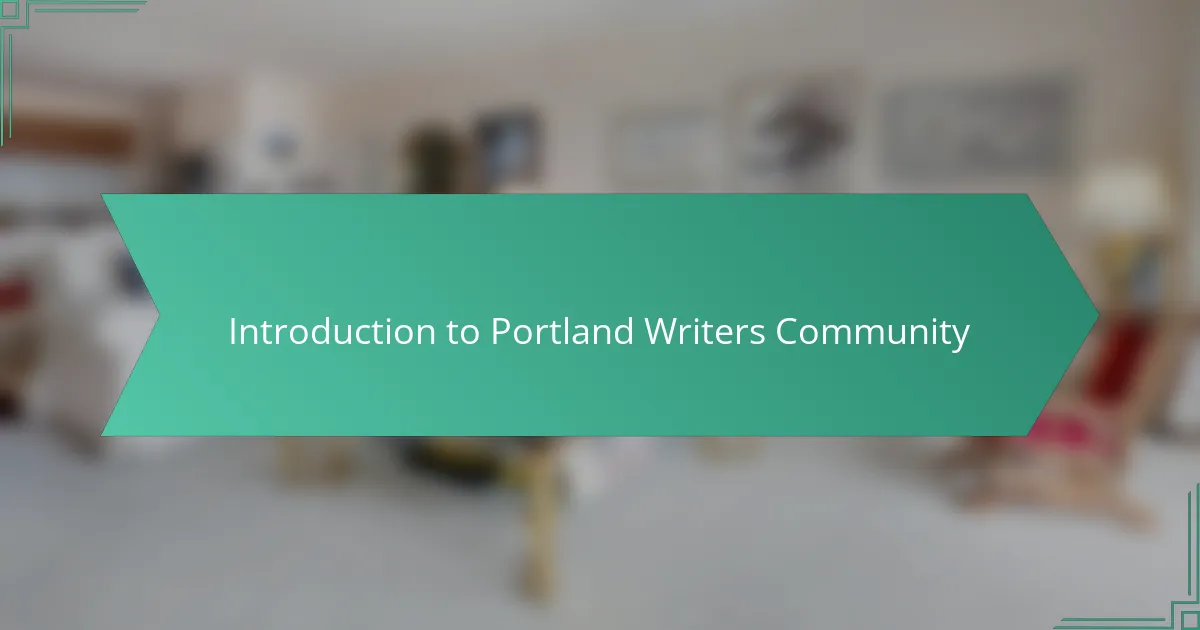
Introduction to Portland Writers Community
Portland’s writing community feels like a hidden gem I stumbled upon—a place where passion for words is palpable in every corner of the city. Have you ever experienced a group that not only values creativity but nurtures it through genuine connection? That sense of belonging has made all the difference in how I see my work and myself as a writer.
What strikes me most about this community is its openness and diversity. Writers of every genre, background, and experience level come together here, creating an energy that’s both inspiring and supportive. It’s not just about sharing work; it’s about fostering growth in a way I hadn’t found elsewhere.
I often think about how this environment changed my approach to writing and critique. The encouragement to experiment and the thoughtful feedback have challenged me to dig deeper into my craft. Isn’t that what every writer secretly hopes for—a place where their voice is heard and uplifted? Portland’s writers community truly offers that rare space.

Understanding Literary Arts Organization
Literary Arts feels like the heartbeat of Portland’s literary scene—a place where stories are not just told but celebrated in all their complexity. Have you ever walked into a space buzzing with creative energy, knowing that every event or workshop is a chance to connect deeply with words and ideas? That’s the kind of atmosphere Literary Arts fosters.
I remember attending my first reading there, feeling both nervous and excited. The genuine enthusiasm in the room made me realize this wasn’t just an organization; it was a creative family. This sense of shared passion makes the work of critique not just insightful but deeply meaningful.
What I find particularly striking about Literary Arts is their commitment to inclusivity and innovation. They don’t just preserve the literary tradition—they actively shape its future. Isn’t that the kind of environment every writer wants—to be part of something that honors the past while pushing boundaries?
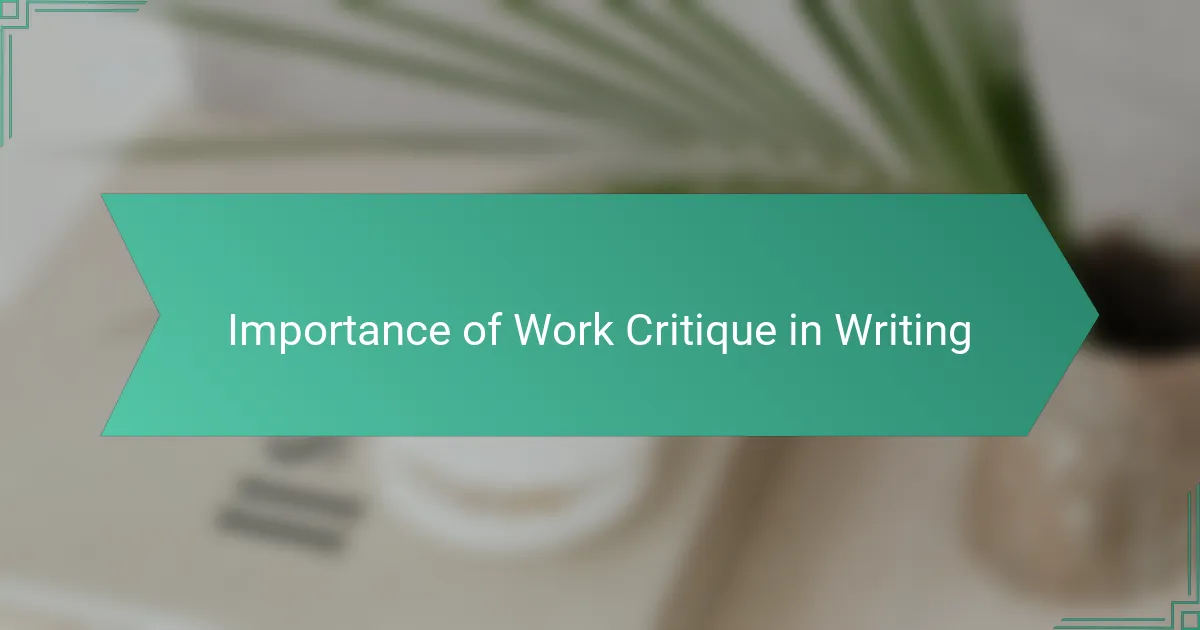
Importance of Work Critique in Writing
Critique is the mirror that reflects the true shape of my writing, revealing angles I might miss on my own. Have you ever been so close to your work that it feels like blinders have formed? That’s where honest feedback breaks through, helping me see beyond my intentions and sharpen the story.
When I first shared my writing at Literary Arts, the critiques weren’t just corrections—they were invitations to explore new possibilities. I remember feeling vulnerable yet excited, because I knew that each comment was a step toward growth. Isn’t it incredible how thoughtful critique can turn uncertainty into confidence?
At its core, critique isn’t about judgment; it’s about connection. The exchange of perspectives reminds me that writing is a conversation—a dynamic process shaped by many voices. Without that dialogue, how can a piece truly find its fullest expression?
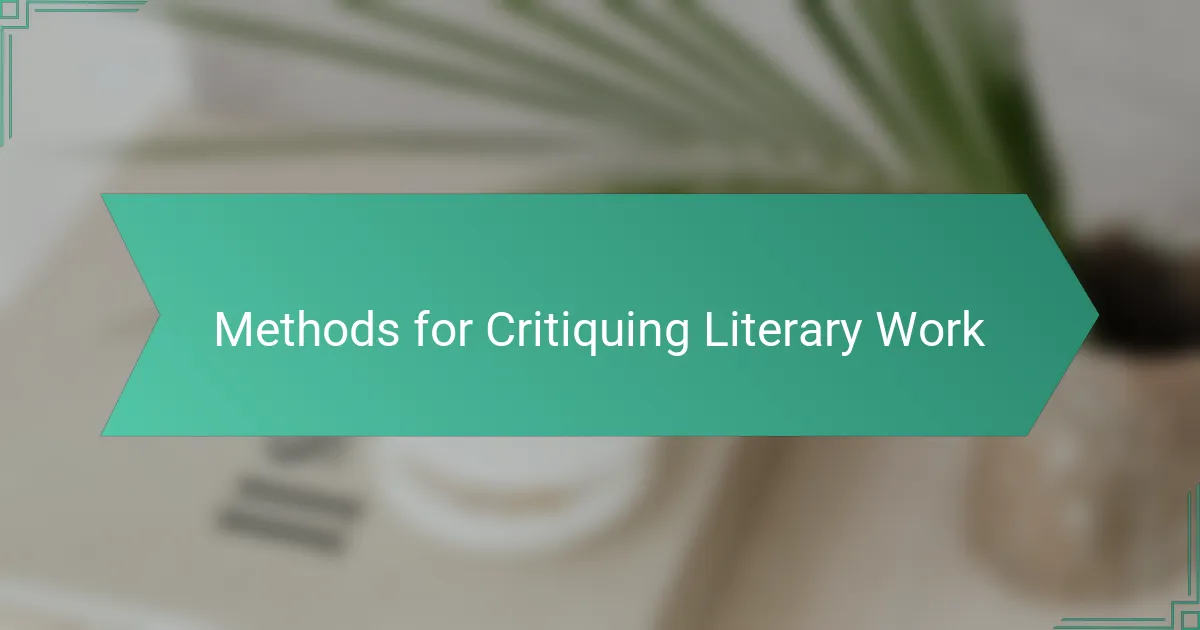
Methods for Critiquing Literary Work
When I first started critiquing at Literary Arts, I quickly realized that reading aloud was one of the most powerful methods. Hearing the words spoken reveals rhythms and awkward spots I might overlook on the page. Have you ever noticed how a sentence that looks fine can suddenly feel clunky when spoken? That moment of discovery always shifts my thinking.
Another method that reshaped my approach was focused, line-by-line feedback. Instead of just noting if a story “works” or not, we dig into specifics—why a phrase sings or falls flat. This detailed attention feels like giving a piece the respect it deserves, and I often find that these micro-observations unlock bigger insights.
I also learned the value of balancing critique with encouragement. Pointing out strengths isn’t just kindness—it builds trust and openness. When I offer feedback at Literary Arts, I ask myself: How can I help this writer grow without dimming their voice? Finding that balance makes every session feel less like critique and more like collaboration.
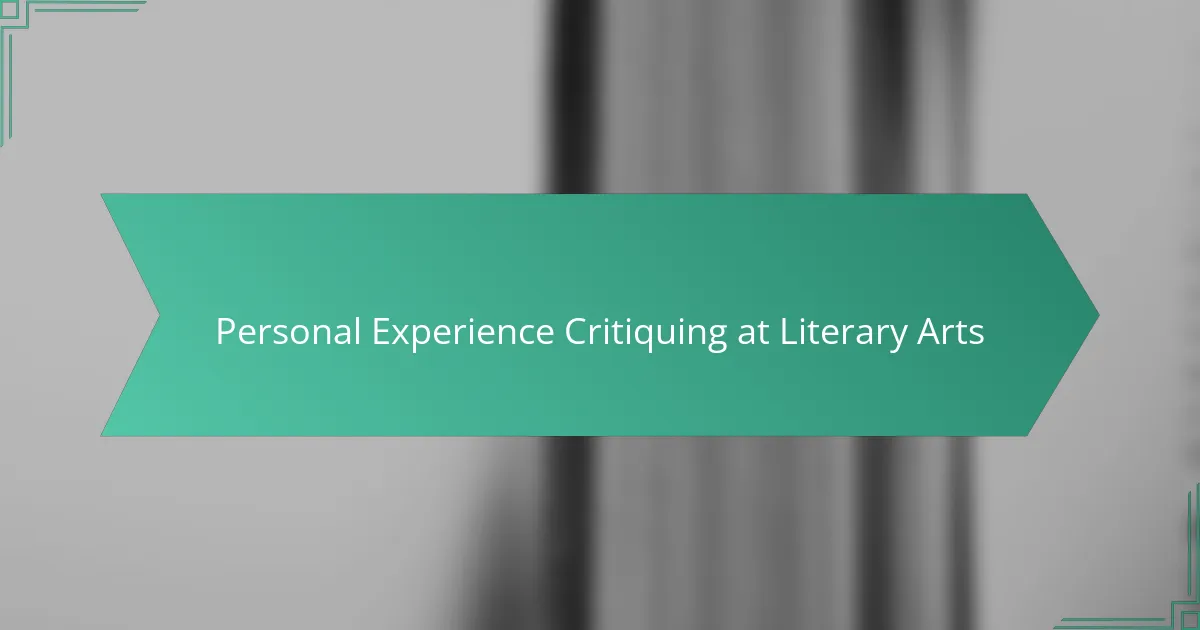
Personal Experience Critiquing at Literary Arts
Getting the chance to critique work at Literary Arts has felt like stepping into a shared creative space where vulnerability is met with respect and curiosity. I remember one workshop where a story’s rhythm didn’t quite land for me until the writer read it aloud—suddenly, everything clicked, and I realized how powerful those moments of collective listening are. Have you ever experienced that surprise when feedback uncovers something completely new about a piece? It’s a reminder that critique is as much about discovery as it is about evaluation.
At times, offering detailed line-by-line feedback challenged me to slow down and truly honor the writer’s choices. I found myself asking, “What is this word or image trying to do here?” rather than rushing to point out flaws. That shift made the critique feel less like correction and more like a conversation, which is exactly what Literary Arts fosters so beautifully. The trust built in those moments made the process feel less intimidating and far more rewarding.
What I find most meaningful is how critique sessions there always balance honesty with encouragement. I’ve seen writers light up when their unique voice is recognized alongside suggestions for growth. It makes me wonder: isn’t that kind of thoughtful, compassionate feedback what every writer secretly craves? At Literary Arts, the critique becomes an act of care—a chance to support each other’s journeys in this challenging craft.
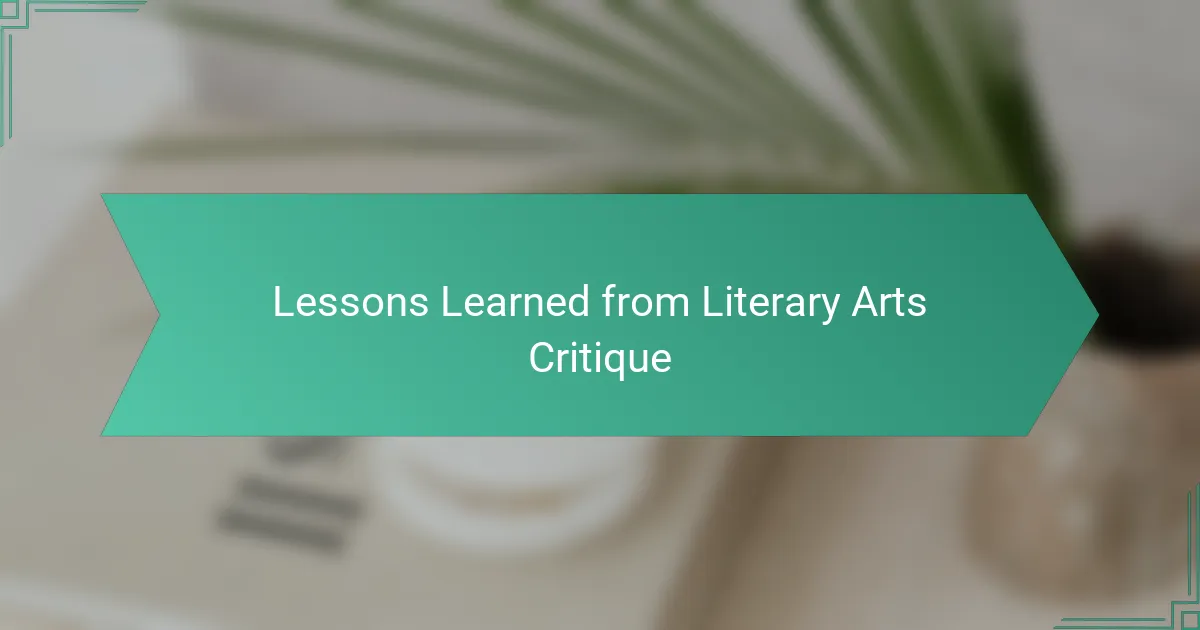
Lessons Learned from Literary Arts Critique
One lesson I’ve taken to heart from critiquing at Literary Arts is how essential patience is—both with the work and with myself. Have you ever found yourself rushing a judgment or missing nuances because you skimmed too quickly? Slowing down allowed me to uncover deeper layers in stories and appreciate the writer’s unique choices, which transformed my feedback from surface-level notes to meaningful dialogue.
I also learned that vulnerability isn’t just for the writer sharing their piece; it’s for the critic too. Admitting when I don’t fully understand a metaphor or need clarification helped create a space where honest questions fostered richer discussions. Isn’t it fascinating how this openness shifts critique from criticism to collaboration?
Perhaps the most powerful takeaway has been recognizing critique as a gift rather than a hurdle. Each comment, even if tough to hear, carries the intention of growth and connection. When I remind myself of this, giving feedback feels less like evaluation and more like an act of shared care—something that truly sustains a writer’s journey.
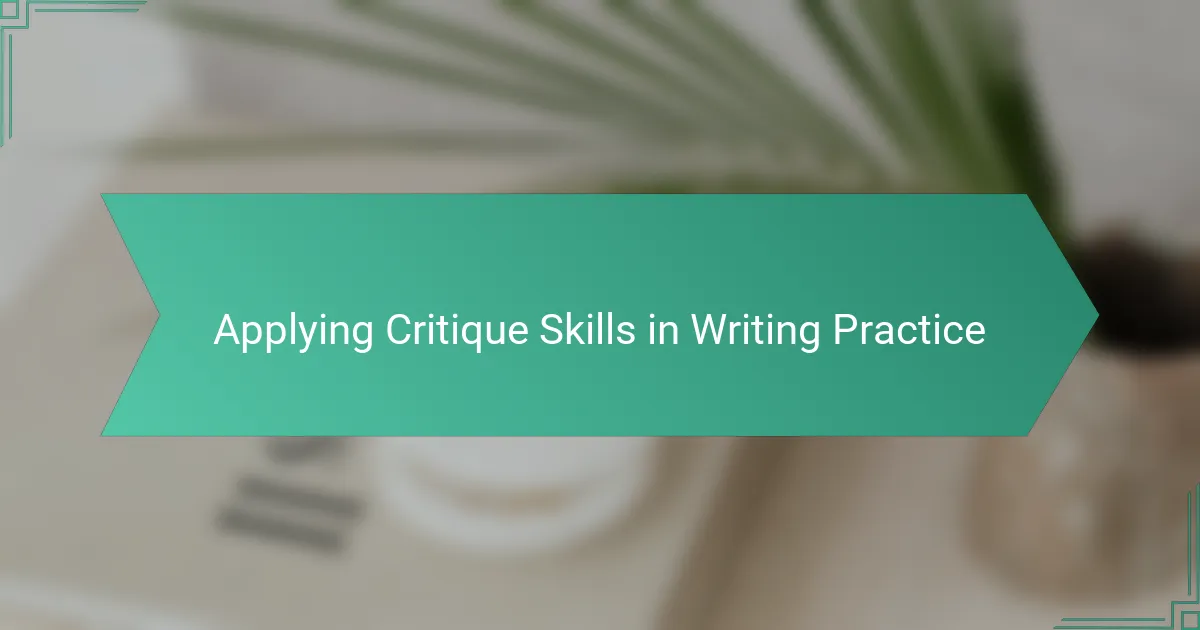
Applying Critique Skills in Writing Practice
Applying critique skills in my own writing practice has been a game-changer. I began to notice how stepping back and viewing my work through a critic’s lens helped me identify unclear moments and stronger narrative choices I might have missed otherwise. Have you ever caught yourself re-reading a sentence and suddenly realizing it doesn’t flow at all? That’s when applying critique skills becomes essential—it turns those blind spots into opportunities for improvement.
One technique I found invaluable was treating my drafts as if they belonged to someone else. This mental shift helped me judge the work more objectively, allowing me to separate personal attachment from critical insight. It felt like having a conversation with myself—asking, “Does this really convey what I want?” and then answering honestly. This process isn’t always comfortable, but it’s where meaningful growth lives.
Sometimes, I also practice reading my writing aloud, especially after applying critique notes. Hearing the words spoken back brings new clarity about pacing and tone. It’s astonishing how a phrase that seemed perfect on the page can suddenly sound awkward or flat when voiced. Have you tried this? If not, I’d encourage you to listen carefully—it might surprise you how critique skills, when applied thoughtfully, breathe fresh life into our writing.